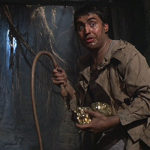Reading Is Worship 1: Foreword
Whatever story we’re reading, seeing, or hearing, we’re not simply critiquing, being entertained, or even enjoying or discerning truths and beauties. We’re worshiping.
 That’s what this new series is about: what and how speculative stories help us worship.
That’s what this new series is about: what and how speculative stories help us worship.
First, though it sounds silly, we may wrongfully, narrowly define “worship” as “singing, likely in one place at a particular time, such as Sunday morning.” I suspect more people would debunk that than affirm it, but I also suspect I’m being overly optimistic. So let’s clarify what I mean by “worship.”
1. Worship is more than singing.
Naturally this comes first. Has any Scripture, Church father, or noted Christian thinker ever claimed otherwise? I doubt even the most annoying and false-doctrine-riddled books have ever made such a claim. The suspicion otherwise is instead a folk-theology “meme,” floating about and un-attributed. Subconsciously we think: “singing = worship, not singing = non-worship.” But it takes only a light logical touch to persuade us otherwise.
In any activity, we worship something. For the Christian, we should be worshiping God:
So, whether you eat or drink, or whatever you do [certainly including reading fiction], do all to the glory of God.
1 Corinthians 10:31
Whatever you do, work heartily, as for the Lord and not for men, knowing that from the Lord you will receive the inheritance as your reward. You are serving the Lord Christ.
Colossians 3: 23-24
2. Worship is service.
In whatever our work, “You are serving the Lord Christ,” Paul says in Col. 3:24. Lest anyone balk at that, there is no such thing as the false dichotomy of “serving Christ” versus “serving nothing and being independent.” Without service to Christ, we are slaves to sin and death:
For when you were slaves of sin, you were free in regard to righteousness. But what fruit were you getting at that time from the things of which you are now ashamed? For the end of those things is death. But now that you have been set free from sin and have become slaves of God, the fruit you get leads to sanctification and its end, eternal life.
Romans 6: 20-22
3. Worship is service we enjoy.
I love Paul’s pragmatism to the Romans. See what you get by being a slave of righteousness! he announces. Similarly, Jesus never argues, “Join my Kingdom because it’s your duty and it’s The Right Thing.” No, He taught about rewards — first, spiritual resurrection and more of Himself right now, and then spiritual, even physical rewards in the future, for His glory.
That doesn’t minimize our suffering. It deepens it. After all, He Himself, “for the joy that was set before him endured the cross, despising the shame, and is seated at the right hand of the throne of God” (Hebrews 12:2). “He died out of love” is true. But so is “He died for joy.”
4. Worship isn’t always conscious.
From experience I can claim this: I end up worshiping wrong things without even knowing it. When my computer locks up (as it recently did for real, due to the horribly complex task of saving this very document) and I get irked, I betray a subconscious worship of myself. My assumption is this: “I run this universe, I’m god, and the universe ought not sin against me.”
More positively, I’m not convinced worship of God needs to be fully “conscious” either. That is, I wonder: can someone worship God without specifically praying to, singing to, or even thinking about God? It would seem that is at least closer to “optimal” worship.
For example, consider Christians’ fight for humility. I’ve found that while intentional rejection of pride is very helpful, that can also backfire; as Screwtape pointed out, we can think to ourselves, “By Jove! I’m being humble,” then become proud of that. Rather, true humility seems to happen when we’re lost to ourselves, focusing on either others’ good, or Godly enjoyment. Naturally we ought to thank God for such good gifts. But it seems closer to humility — and worship — to not even think of how we can “use” that gift for other ends.
5. Worship of God is what Christ saves people to do.
Skip the ever-popular yet -controversial P-word here (predestination). The Apostle Paul starts the book of Ephesians like this:
Blessed be the God and Father of our Lord Jesus Christ, who has blessed us in Christ with every spiritual blessing in the heavenly places, even as he chose us in him before the foundation of the world, that we should be holy and blameless before him. In love he predestined us for adoption as sons through Jesus Christ, according to the purpose of his will, to the praise of his glorious grace, with which he has blessed us in the Beloved.
Ephesians 1: 3-6
“God saved me out of His love.” True. “He saved me so I could praise His grace.” Also true.
6. Worship is a battle, at least in this age.
Whatever your views on holiness, we can all agree: Scripture encourages us to fight for it. One of the best texts on this is Phil. 2: 12-13, which perfectly presents God’s work in us to make us holy, and our effort to do the same. Without holiness, we can’t get close to God; without getting close to God, we can’t worship Him. Thanks to Jesus’s life and death, those who repent and believe Him are not only counted guiltless, but counted righteous because of His righteousness. Yet until our resurrection, after His, we groan (Romans 8) and fight.
But of course, during that fight, we’re often eating, drinking, working, and reading, for other “glories.” It’s never “just a story”; it’s never “just entertainment.” All reading is worship — of God, or something else, or for the sin-fighting Christian, a mixture of each.
When you read epic stories, what or who do you worship, by intention or accident?
Coming next week and after: more on those wrong sorts of worship while we read.











































Kind of seems all-inclusive to call all reading “worship”. Worship is an attitude of the heart. Reading is a form of communication. We can communicate just fine without worshiping. (When Richard Dawkins rants about there being no God, is he worshiping? Is it worship to read/listen to his statements?)
Saying that “reading speculative fiction is an act of worship” seems to me to have a logical problem somewhere. It’s up there with the Veggietales song, “If it’s a nickle or a salad or a pillow, if it doesn’t have a tail, it’s not a monkey, it’s an ape!”
I’ve read some Christian speculative fiction lately that made me doubt my own faith. For me, it wasn’t worship. It was a lot closer to blasphemy.
Communicating … the author’s attitudes of the heart, applied in story.
My guess is that he’s worshiping Richard Dawkins!
I think it can be. My first thought is of Daniel, the Hebrew prophet brought into the Babylonian equivalent of Hogwart’s. He studied pagan literature, false religion, and surely even “sorcery,” though he never practiced it, all for the glory of God.
Similarly, the Apostle Paul was clearly well-versed in Greek poetry, and his use of a truth as a cultural touchpoint — a truth incidentally reflected by a Cretan poet (though wrongly applied to Zeus) — was surely a God-worshipful act (Acts 17).
Ah-ha, sounds like a real winner of a book! That brings up another question: how might we worship when reading bad books? Is there a way to glorify God — please Him, “get more of” Him — in that reading? Maybe by contrast? (Thank You, Lord, that Your Story and others by other authors are so much better than this one!)
Again, I’m convinced that worship occurs all the time. This side of eternity, we cannot worship God “optimally,” but we can approach that point. Without His help, though, we wouldn’t care to worship Him at all. That’s an encouraging thought.
Great article, Stephen!
Sometimes we forget that everything we do can be an act of worship. It’s a question of what are we worshiping?
As far as books, I love when a book brings me closer to God. I am finishing a biography on Dietrich Bonhoeffer (it’s taken me a month to get through) and boy has it impacted my life! Other books have had a similar impact (many non-fiction, but there are fiction as well) like:
Lord of the Rings. Each character wins, and loses, at the same time. It’s a story of sacrifice, of helping one another, and believing when there is no hope left.
Secret of the Rose Series by Michael Phillips. For the first time, I saw God as a Father figure and how God displays Himself through His creation. That’s not what the books are about, but that’s what I picked up.
Hunger Games. Made me think about what it would be like to face a world like that as a Christian.
A Star Curiously Singing: How God is still there, even when no one remembers Him anymore. And how He still reaches for us.
I could go on, but as you can see, both Christian and non-Christian books speak to me and draw my heart toward God.
I also worship through my own writing. I love writing fiction and exploring deep issues. Many times as I am writing a scene, I find myself in awe of God: His love for us, how deep and damaging our sin is, and how far God goes to redeem us. It is a beautiful thing. And I hope that through my writing, I bring others to worship God as well.
Excellent approach, Stephen. I agree with your approach about what worship is, and am looking forward to this series!
Another way I sometimes look at it is worship includes “paying attention to”. Yes, it is my service… and part of serving something is giving it my attention. When I read a book, I am setting everything else aside and paying attention to things in the book. As I read, I am agreeing with, or disagreeing with, what I read. I am enjoying and glorifying in my mind those things that I agree with as I read. I am giving them a place in my mind and heart by letting them enter through my eyes.
Looking forward to seeing where you go with this!
Christian speculative fiction that made a reader doubt her faith? Interesting. It makes me wonder what the fiction was, why it caused doubt, and just how Christian it was. Also, if others reading whatever this was found their faith strengthened by reading it.
Martin, I think it’s funny that we jump so quickly to judging the fiction (“how Christian was it?”) rather than the reader.
There are reasons for doubt in nature… in looking at human activities and tragedies… in reading non-fiction…
Reasons to doubt are all around us. If we’re doubting, why blame the item that provoked us? The problem is inside each of us, not the item itself. Circumstances are notorious for contradicting the promises of God. Only faith, only choosing to believe what He says in His Word without natural evidence to support it, is pleasing to God. Faith.
That said, every individual is on a unique path and journey. There are things (writing of “great” Christian philosophers and theologians) that confused me as a young Christian that now I find rich and meaningful. It doesn’t surprise me that someone could be confused by some Christian spec fic. By nature, it explores the far reaches and outer boundaries of things. What will reach one person with hope might instill despair or anger in someone else. I try to keep an open mind… and let my faith be grounded in daily interactions with Him and His Word.
The seeds of doubt are in my own sinful heart and not in any book, but a writer who takes serious existential questions and throws them aside, or who indiscriminately applies spiritual cliches, is setting up fellow Christians — “weaker” in faith though we may be — to stumble.
Yeah, good point, Bainespal. When we open our mouth or speak and especially when we sit down and write, our words are powerful. Powerful forces either for good or harm.
I take my responsibility as a writer very seriously, and like 1 Peter 4:11 says, I seek to speak “as the oracles of God”, that is, with the care and awareness and “holy fear” that I ought to have when wielding the sword He’s given me.
May His army of writers do their best, and leave the rest in His hands!
In Kessie‘s defense, I think I understand what she meant by this:
While I may not actually doubt my faith after reading a Christian-speculative novel, I certainly doubt whether the Spirit is as active as He promises to be.
For example, if the story is horribly written, I wonder, Why was this so terrible, when God is so amazing and worth only the best stories His people can craft? If it contained horrible theology, I wonder, Why does He let things like this get so popular, and thereby slander His truth, goodness, and beauty?
Mind you, I think someone could read such a book and still be worshiping, or glorifying God, at least by contrast. (Thank You, God, that Your truth and beauty is far better than this silly story would have me believe!) But it’s a bit of a stretch, and I would much rather be exposed to a story that reinforces God’s truth and beauty, and echoes those of the true Story in which we live.
We had a talk about worship in the wider sense at summer camp—and my overall conclusion is that very little of the singing in church is worship. But that point aside, I really do think everything can be worship.
Question: what do our readers think is the most significant potential idolatry that could result from enjoying speculative stories — Christian or otherwise?
I ask because I’m writing part 2 tomorrow morning.
Most people seem to enjoy spec fic for the experience — the terror of the unknown, the mental stimulation of the theoretical science, the emotional attachment with the characters, the excitement of a new world and the mental escape into that world.
So I think the most significant potential idolatry is when we worship the creation instead of the Creator — in this context, we could revel in the emotional experience of the story and give the story all the credit for what we’re feeling without attributing it to the One who (may have) inspired the story or whose Spirit was revealing amazing truths to us while we read it.
Thanks much for your thoughts, Teddi. Your word experience helped clarify what I had been thinking about one possible idol: story-worship. But phrasing it my way could imply that taking pleasure in a story is somehow sinful (which is not true). One may, however, worship the experience rather than the eternity it foreshadows, and the pleasure rather than the Giver of all good pleasures. More on that is in part 2, today.
[…] easy? Criticizing competing idol outlet malls. That’s my temptation as I start this series: first define worship, then go after others’ wrong worship […]
[…] try to define rightful worship here, and began exploring false worships, idolatry, […]
[…] I believe that Reading Is Worship, “worship” as briefly defined in part 1 of this […]